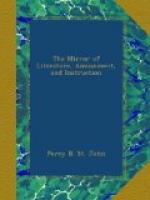About this time Munden appears to have first imbibed a taste for the stage, and with it an admiration of the genius of Garrick; indeed, he had seen more of Garrick’s acting than had any of his contemporaries in 1820, Quick and Bannister excepted. What a fine president would Munden have been of the Garrick Club, the members of which probably know as much about Garrick as they care about Thespis. Acquaintance with an actor fed Munden’s penchant for the stage, but did not fill his pocket. Both started for Liverpool, the actor upon an engagement, but Munden in hope of one; the latter engaged in the office of the Town Clerk, but only realized his hope in copying for the theatre, walking in processions, and bearing banners, at one shilling per night! At length he acted the first Carrier in Henry IV. He next joined a company at Rochdale, which he soon left, and returning to Liverpool, smothered his dramatic passion for two years, when he started for Chester, with a light heart, a bundle wardrobe, and a guinea. He entered Chester with his “last shilling,” which he paid for admission to the theatre, little thinking of provision for the night. Yet Munden, in later life, was a prudent, parsimonious man. At the close of the performance he fell in with a person who had been a butcher’s apprentice in Brooks’s Market, and who remembering young Joseph’s antic tricks, gave him good cheer, and money for his return to London. On the road, necessity overtook him, when meeting a Warwickshire militia-man, who was marching to the town at which he was billeted, Munden prevailed on the soldier to represent him as a comrade. The trick told: he was ordered to the general mess-room and received as one among the warriors; and his lively humour made him king of the company for the night. Next morning the regiment mustered, and Munden was told to follow and be enlisted; but, as he had obtained all he wished, a supper and a bed, he left his military friends to their glory,[1] and proceeded to London. Here he again returned to the law, but once more emerged from it, and joined a company at Leatherhead, as a representative of old men. But the theatre was burnt. Munden next played at Windsor with tolerable success, at half a guinea per week; and subsequently at Colnbrook and Andover. He returned to London, and thence went to Canterbury, in 1780, to play low comedy characters, where he first became what theatrical biographers term “a favourite.” After other provincial engagements and a short trial of management at Sheffield, Munden appeared December 2, 1790, (a few nights after the first appearance of Incledon,) at Covent Garden Theatre as Sir Francis Gripe, in the Busy Body, and Jemmy Jumps in the Farmer; his success in which parts after the impressions made by Parsons and Edwin was little short of a miracle. His popularity now became settled. He was the original representative of Old Rapid, Caustic, Brummagem, Lazarillo, (Two Strings




